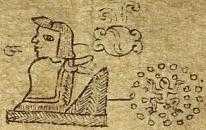Tezozomoc (Azcapotzalco)
| Tezozomoc | |
|---|---|
| King of Azcapotzalco | |
 | |
| Reign | 1367 or 1370–1426 |
| Died | 1426 |
| Predecessor | Acolnahuacatzin |
| Successor | Tayatzin |
| Consort to |
Chalchiuhcozcatzin Tzihuacxochitzin I |
| Issue |
Epcoatzin Icel Azcatl Itzpapalocihuatl Aculnahuacatl Tzaqualcatl Tlacochcuecihuatl Chichilocuili Maxtla Xaltemoctzin Xiuhcanahualtzin Quaquapitzahuac Ayauhcihuatl Tayatzin |
| Father | Acolnahuacatzin |
Tezozomoc Yacateteltetl (also Tezozómoc, Tezozomoctli, Tezozomoctzin; born 1320), was a Tepanec leader who ruled the altepetl (ethnic state) of Azcapotzalco from the year 1353[1] or Five Reed (1367)[2] or Eight Rabbit (1370)[3] until his death in the year Twelve Rabbit (1426).[4] Histories written down in the early colonial period portray Tezozomoc as a military and political genius who oversaw an expansion of Tepanec influence, bringing about Azcapotzalco's dominance in the Valley of Mexico and beyond.[citation needed]
Biography
Tezozomoc was a son of Acolnahuacatzin and Cuetlaxochitzin. He is described by Fernando de Alva Cortés Ixtlilxochitl as a tyrant and: "the most cruel man who ever lived, proud, warlike and domineering. And he was so old, according to what appears in the histories, and to what elderly princes have told me, that they carried him about like a child swathed in feathers and soft skins; they always took him out into the sun to warm him up, and at night he slept between two great braziers, and he never withdrew from their glow because he lacked natural heat. And he was very temperate in his eating and drinking and for this reason he lived so long."[citation needed]
His wives were Chalchiuhcozcatzin and Tzihuacxochitzin.
According to the Crónica mexicáyotl, Tezozomoc had several sons, all of whom he made rulers:
- Aculnahuacatl Tzaqualcatl, who was installed as ruler of Tlacopan,
- Quaquapitzahuac, who was installed as ruler of Tlatelolco,
- Epcoatl, who was installed as ruler of Atlacuihuayan,
- Tzihuactlayahuallohuatzin, who was installed as ruler of Tiliuhcan,
- Maxtla, who was installed as ruler of Coyoacán.[5]
He approved the choice of King Huitzilihuitl in 1403 and gave him his daughter Ayauhcihuatl in marriage, notwithstanding the opposition of his son Maxtla. He declared war against the king of Texcoco, Techotlalatzin, and being defeated sued for peace; but after the latter's death he continued the war against his successor, Ixtlilxochitl I, whom he defeated and assassinated in 1419, usurping the crown of Texcoco.[1]
Upon Tezozomoc's death in the year Twelve Rabbit (1426), his son Tayatzin became a king, but Maxtla seized power at Azcapotzalco, leaving the rulership of Coyoacán to his son Tecollotzin.[6]
Tezozomoc was a grandfather of Tlacateotl, Matlalatzin, Huacaltzintli and Chimalpopoca and great-grandfather of Tezozomoc of Ecatepec.
Notes
- ↑ 1.0 1.1
 Wilson, James Grant; Fiske, John, eds. (1889). "Tetzotzomoc". Appletons' Cyclopædia of American Biography. New York: D. Appleton
Wilson, James Grant; Fiske, John, eds. (1889). "Tetzotzomoc". Appletons' Cyclopædia of American Biography. New York: D. Appleton - ↑ Chimalpahin (1997): pp. 228–229.
- ↑ Chimalpahin (1997): pp. 210–211
- ↑ Chimalpahin (1997): pp. 126–127, 230–231.
- ↑ Chimalpahin (1997): pp. 126–129.
- ↑ Chimalpahin (1997): pp. 128–129, 230–231.
References
- Chimalpahin Cuauhtlehuanitzin, Domingo Francisco de San Antón Muñón (1997). Codex Chimalpahin: society and politics in Mexico Tenochtitlan, Tlatelolco, Texcoco, Culhuacan, and other Nahua altepetl in central Mexico: the Nahuatl and Spanish annals and accounts collected and recorded by don Domingo de San Antón Muñón Chimalpahin Quauhtlehuanitzin. The Civilization of the American Indian Series. edited and translated by Arthur J. O. Anderson and Susan Schroeder. Norman: University of Oklahoma Press. ISBN 0-8061-2921-2.
Further reading
- The Aztecs, Nigel Davies.
| Preceded by Acolnahuacatzin |
Tlatoani of Azcapotzalco 1371–1426 |
Succeeded by Tayatzin |